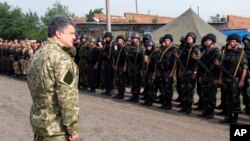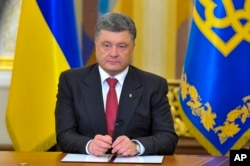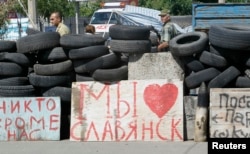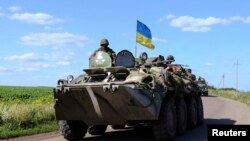Ukraine launched new military operations Tuesday against pro-Russian separatists in the east, hours after President Petro Poroshenko announced he would not renew a cease-fire but would go on the offensive to rid Ukraine of "parasites."
Ukrainian forces claimed to have retaken one of the checkpoints along the Russian border held by the rebels. Ukraine's President Petro Poroshenko called it the first victory in the revived anti-terrorist operation.
The U.S. and its European allies have accused Russia of arming the insurgents in eastern Ukraine.
Russian President Vladimir Putin directly blamed Poroshenko for the renewed fighting, complaining he could not persuade the Ukrainian leader to extend the cease-fire.
Putin said Russia would use all available tools to vigorously defend the rights of Russians abroad.
The State Department said Secretary of State John Kerry telephoned Russian Foreign Minister Sergei Lavrov Tuesday, saying he is strongly concerned that the Russian-backed rebels refused to take steps to de-escalate the crisis – moves that could have extended the cease-fire.
Within hours of Poroshenko's early-morning announcement, the military went into action against rebel bases and checkpoints in the east, which has been in separatist foment since April.
Saying Ukrainian forces had launched attacks "from the air and land," the defense ministry said: "The terrorists' plan to significantly escalate armed confrontation has been disrupted and the threat of losses to the civilian population and service personnel has been liquidated."
Gunfire broke out Tuesday afternoon in Donetsk, the capital of one of the two regions that pro-Russian insurgents have declared independent, the Associated Press reported.
Gunmen appeared to be trying to take control of the regional police headquarters. An AP journalist saw some blood on the streets but no wounded people.
There was no immediate word on casualties.
Warning to Kyiv
Russia on Tuesday warned authorities in Kyiv they would be held responsible for the ongoing military operation against separatists in eastern Ukraine after they refused to extend a unilateral cease-fire.
"One will have to answer for the crimes against peaceful civilians," the foreign ministry said in a statement. "We demand that Ukrainian authorities stop shooting at their own country's peaceful cities and villages."
Poroshenko, who accuses Russia of fanning the conflict and allowing fighters and equipment to cross the border to support the rebels, eschewed renewing a 10-day unilateral cease-fire after several days of four-way telephone talks involving Putin and German and French leaders.
Poroshenko said in his early morning statement that Ukraine had not seen "concrete steps for de-escalating the situation, including strengthening controls on the border."
EU chooses to wait
European Union governments decided Tuesday that they were not ready to immediately impose new sanctions on Russia over the Ukraine crisis.
Senior EU diplomats met in Brussels Tuesday morning to consider whether new measures were needed after a summit of EU leaders on Friday warned Moscow that sanctions were in the cards if peace talks didn't produce results.
One EU diplomat, speaking on condition of anonymity, said they'd decided to monitor the situation: "The picture on the ground is mixed. In the meantime, there are intensified preparations for sanctions."
Two other diplomats confirmed the assessment.
In Moscow, the foreign ministry hinted that the United States stood behind Poroshenko's decision not to extend the cease-fire.
"There is an impression that the change in Kyiv's position … could not have come about without influence from abroad, despite the position of leading EU member states," it said in a statement.
Separately, the speaker of Russia's lower house of parliament called for a new cease-fire.
"We think that without a truce, without the start of dialogue, it is simply impossible to restore peace, justice and law and order in Ukraine," Sergei Naryshkin, a Putin ally, was quoted as saying.
Anger in Ukraine
Poroshenko, just over three weeks in office, faces rising anger at home and from the new political establishment over military losses. He is under pressure to switch to more forceful action against the rebels after a cease-fire that many say the rebel groups used to regroup and rearm.
A statement tweeted by the Ukrainian foreign ministry on Monday night said 27 Ukrainian servicemen had been killed and 69 wounded since the cease-fire began on June 20.
Poroshenko said he was willing to return to a cease-fire "at any moment" if it became clear that all sides were ready to carry out all aspects of the peace plan, including the freeing of hostages and creating effective border controls.
Poroshenko had extended a government cease-fire last week until 10 p.m. (1900 GMT) Monday to allow for peace talks with a contact group involving separatist leaders, a former Ukrainian president, a senior representative of the OSCE rights and security body and Moscow's ambassador to Kiev.
Moscow's strategy
Experts, who believe Russia is actively supporting the insurgency, say there is a two-pronged strategy being persued in Ukraine.
Pavel Felgenhauer, a defense analyst and columnist with Novaya Gazeta newspaper in Moscow, says that on the one hand the Kremlin arms and otherwise supports separatists in order to maintain leverage with the pro-Western government in Kyiv.
“So Moscow, though wanting a freeze of the present situation ... and not wanting the separatists to be militarily defeated, is supplying arms not in an attempt for kind of help the rebels march on Kyiv, which is hardly possible, but to uphold some kind of military balance on the ground,” says Felgenhauer.
On the other hand, the expert says, separatist fighters try to create a pretext for an incursion.
“They hope that if they provoke more fighting and if the Ukrainian military will begin to grind [rebels] up and there will be high civilian casualties as a result, this will force Moscow’s hand and Moscow would intervene militarily,” says Felgenhauer.
Daniel Schearf contributed to this story from Moscow. Some information for this report provided by Reuters, AP and AFP.








